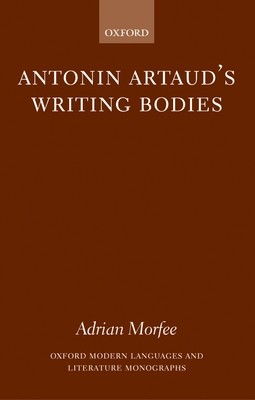
- We will send in 10–14 business days.
- Author: Adrian Morfee
- Publisher: Clarendon Press
- ISBN-10: 0199277494
- ISBN-13: 9780199277490
- Format: 14 x 21.6 x 1.8 cm, hardcover
- Language: English
- SAVE -10% with code: EXTRA
Reviews
Description
Antonin Artaud (1896-1948), perhaps best known as a dramatic theorist, is an important but extremely difficult writer. This book studies the development of his thinking, from the early texts of the 1920s through to the acclaimed but lesser known 1940s writings, on such issues as the body, theology, language, identity and the search for an elusive and unsayable self-presence, and then uses this as a framework in which to read his late texts. New attention is paid to the processes by which his texts generate meanings, the logics that hold these meanings together, and the internal contradictions of the late poetry. This allows a new picture to emerge that accounts for the coherent if unequal development of his ideas as well as the drive towards systematization to be found in even his most opaque writings. By returning to the texts and focusing on the specific terms of Artaud's writing, as well as their gleeful resourcefulness and ludicity, it is argued that Artaud needs to be
considered not as a contestatory psychotic but as a writer of the first magnitude.
EXTRA 10 % discount with code: EXTRA
The promotion ends in 20d.18:26:45
The discount code is valid when purchasing from 10 €. Discounts do not stack.
- Author: Adrian Morfee
- Publisher: Clarendon Press
- ISBN-10: 0199277494
- ISBN-13: 9780199277490
- Format: 14 x 21.6 x 1.8 cm, hardcover
- Language: English English
Antonin Artaud (1896-1948), perhaps best known as a dramatic theorist, is an important but extremely difficult writer. This book studies the development of his thinking, from the early texts of the 1920s through to the acclaimed but lesser known 1940s writings, on such issues as the body, theology, language, identity and the search for an elusive and unsayable self-presence, and then uses this as a framework in which to read his late texts. New attention is paid to the processes by which his texts generate meanings, the logics that hold these meanings together, and the internal contradictions of the late poetry. This allows a new picture to emerge that accounts for the coherent if unequal development of his ideas as well as the drive towards systematization to be found in even his most opaque writings. By returning to the texts and focusing on the specific terms of Artaud's writing, as well as their gleeful resourcefulness and ludicity, it is argued that Artaud needs to be
considered not as a contestatory psychotic but as a writer of the first magnitude.


Reviews